Report: Digital Transformation's Impact on the Logistics Industry
VerifiedAdded on 2023/01/04
|11
|2532
|88
Report
AI Summary
This report provides a comprehensive analysis of digital transformation within the transportation and logistics sector. It begins by defining digital transformation and highlighting its key pillars, including automation, improved manufacturing processes, and product optimization. The main body delves into the impact of various digital technologies such as cloud computing, IoT, Big Data, and AI, emphasizing their role in enhancing efficiency, reducing costs, and facilitating predictive analysis. It also examines the effects of e-commerce and other digital business models, noting their influence on customer expectations and the need for organizations to adapt to changing demands. Furthermore, the report explores evolving forms of customer engagement, emphasizing the use of smart communication technologies and the importance of providing timely and relevant information. Finally, it addresses the changing organizational cultures within the industry, highlighting the need for strong values, work-life balance, and effective communication to maintain customer relationships and foster a competitive environment. The report concludes by summarizing the transformative impact of digital technologies on the logistics sector, emphasizing their potential to drive business performance, create revenue streams, and ensure long-term sustainability.
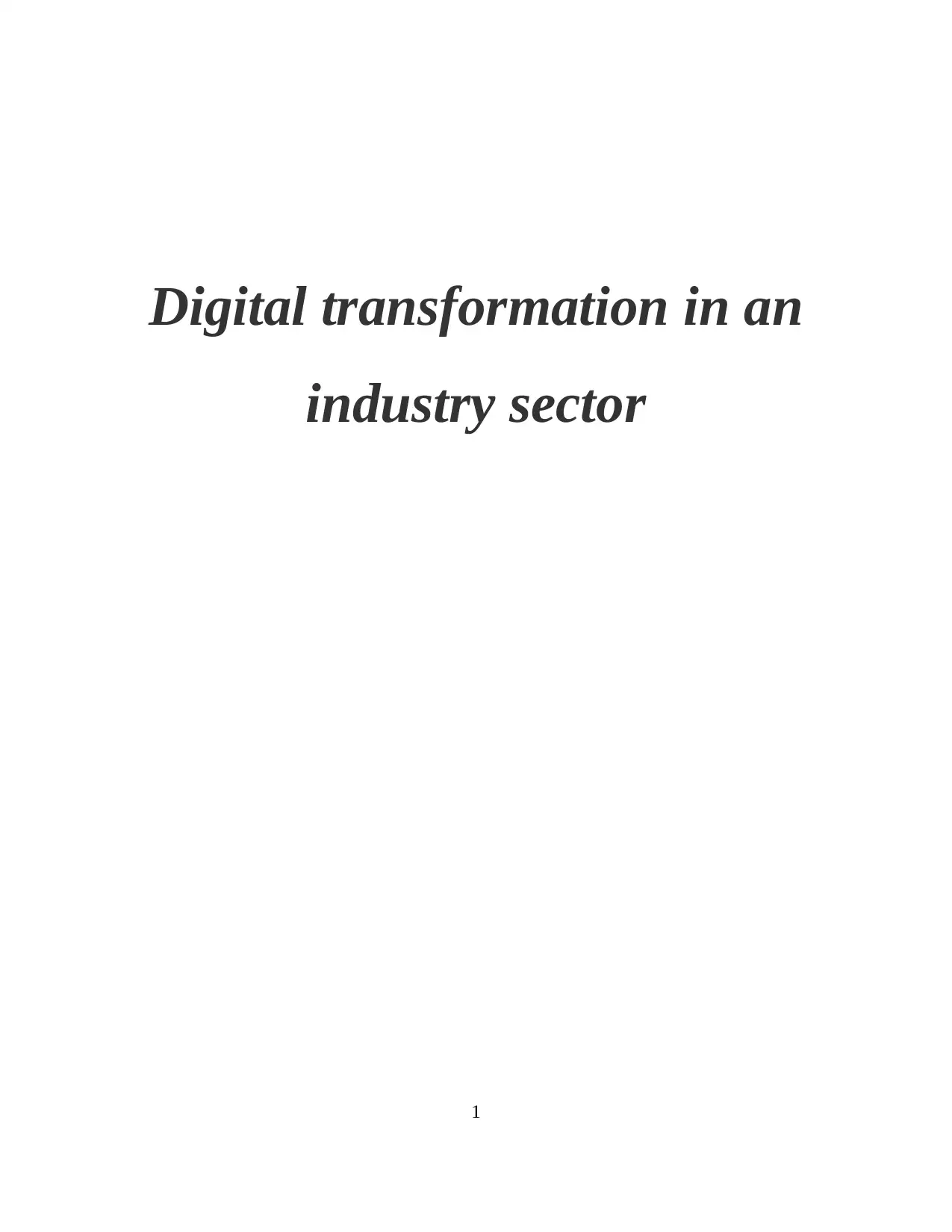
Digital transformation in an
industry sector
1
industry sector
1
Paraphrase This Document
Need a fresh take? Get an instant paraphrase of this document with our AI Paraphraser
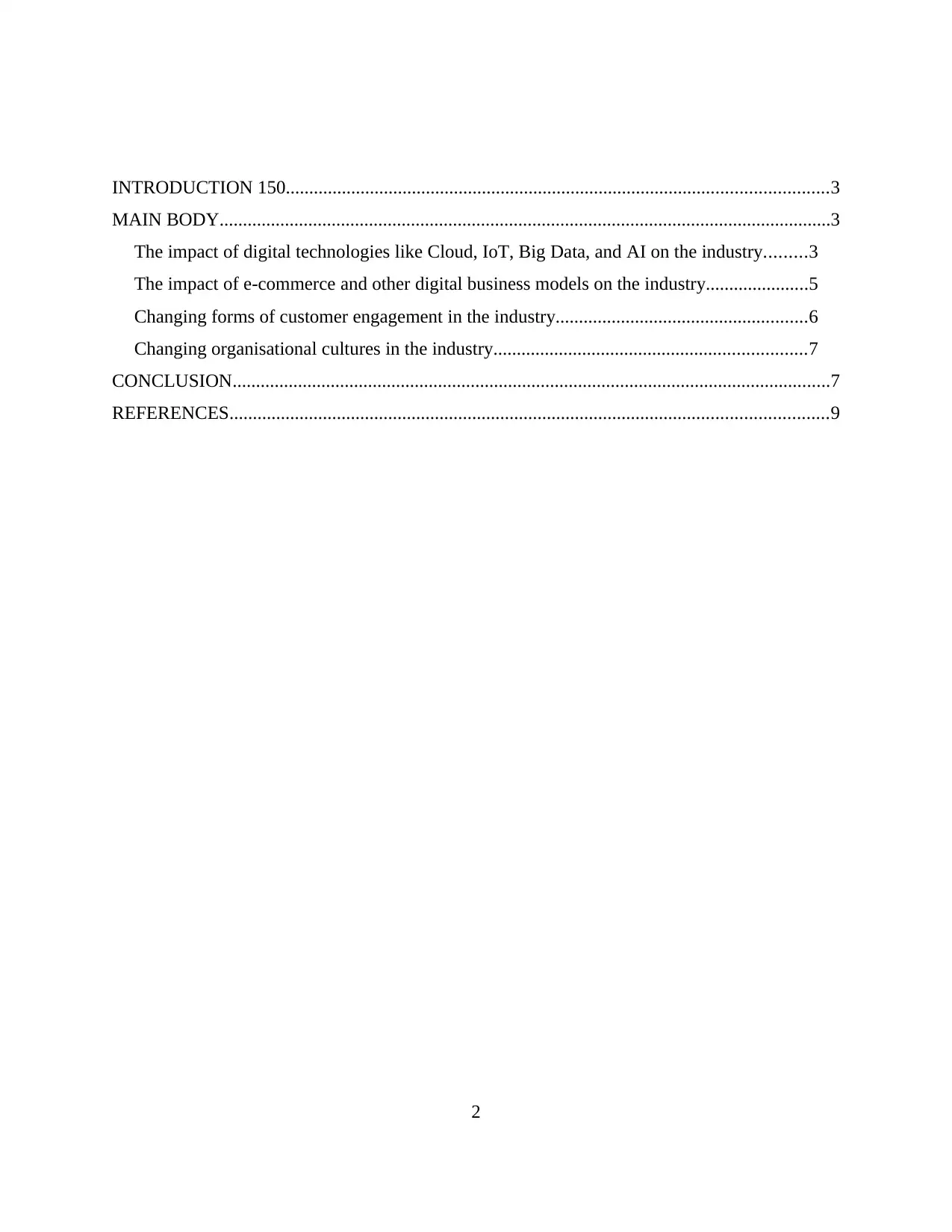
INTRODUCTION 150....................................................................................................................3
MAIN BODY...................................................................................................................................3
The impact of digital technologies like Cloud, IoT, Big Data, and AI on the industry.........3
The impact of e-commerce and other digital business models on the industry......................5
Changing forms of customer engagement in the industry......................................................6
Changing organisational cultures in the industry...................................................................7
CONCLUSION................................................................................................................................7
REFERENCES................................................................................................................................9
2
MAIN BODY...................................................................................................................................3
The impact of digital technologies like Cloud, IoT, Big Data, and AI on the industry.........3
The impact of e-commerce and other digital business models on the industry......................5
Changing forms of customer engagement in the industry......................................................6
Changing organisational cultures in the industry...................................................................7
CONCLUSION................................................................................................................................7
REFERENCES................................................................................................................................9
2
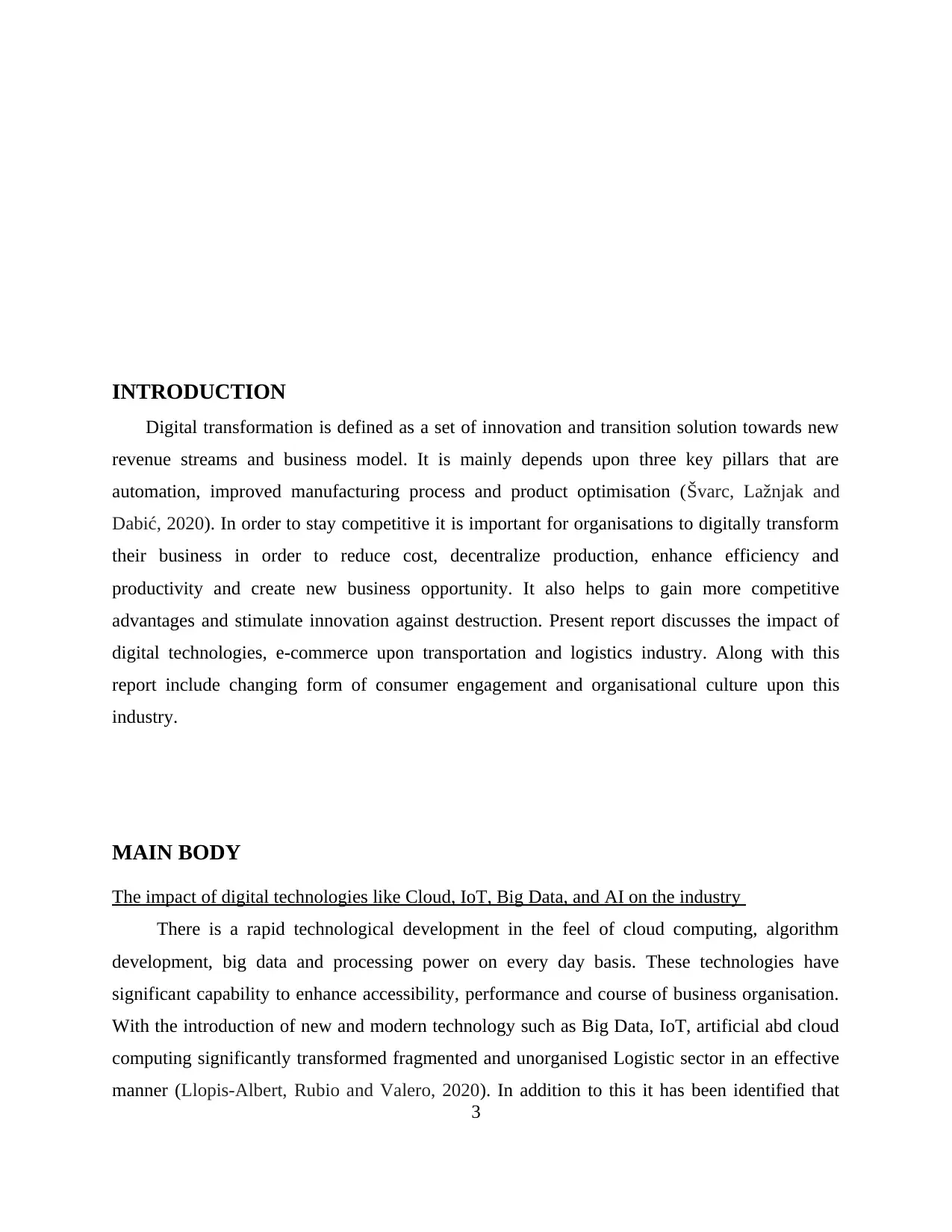
INTRODUCTION
Digital transformation is defined as a set of innovation and transition solution towards new
revenue streams and business model. It is mainly depends upon three key pillars that are
automation, improved manufacturing process and product optimisation (Švarc, Lažnjak and
Dabić, 2020). In order to stay competitive it is important for organisations to digitally transform
their business in order to reduce cost, decentralize production, enhance efficiency and
productivity and create new business opportunity. It also helps to gain more competitive
advantages and stimulate innovation against destruction. Present report discusses the impact of
digital technologies, e-commerce upon transportation and logistics industry. Along with this
report include changing form of consumer engagement and organisational culture upon this
industry.
MAIN BODY
The impact of digital technologies like Cloud, IoT, Big Data, and AI on the industry
There is a rapid technological development in the feel of cloud computing, algorithm
development, big data and processing power on every day basis. These technologies have
significant capability to enhance accessibility, performance and course of business organisation.
With the introduction of new and modern technology such as Big Data, IoT, artificial abd cloud
computing significantly transformed fragmented and unorganised Logistic sector in an effective
manner (Llopis-Albert, Rubio and Valero, 2020). In addition to this it has been identified that
3
Digital transformation is defined as a set of innovation and transition solution towards new
revenue streams and business model. It is mainly depends upon three key pillars that are
automation, improved manufacturing process and product optimisation (Švarc, Lažnjak and
Dabić, 2020). In order to stay competitive it is important for organisations to digitally transform
their business in order to reduce cost, decentralize production, enhance efficiency and
productivity and create new business opportunity. It also helps to gain more competitive
advantages and stimulate innovation against destruction. Present report discusses the impact of
digital technologies, e-commerce upon transportation and logistics industry. Along with this
report include changing form of consumer engagement and organisational culture upon this
industry.
MAIN BODY
The impact of digital technologies like Cloud, IoT, Big Data, and AI on the industry
There is a rapid technological development in the feel of cloud computing, algorithm
development, big data and processing power on every day basis. These technologies have
significant capability to enhance accessibility, performance and course of business organisation.
With the introduction of new and modern technology such as Big Data, IoT, artificial abd cloud
computing significantly transformed fragmented and unorganised Logistic sector in an effective
manner (Llopis-Albert, Rubio and Valero, 2020). In addition to this it has been identified that
3
⊘ This is a preview!⊘
Do you want full access?
Subscribe today to unlock all pages.

Trusted by 1+ million students worldwide
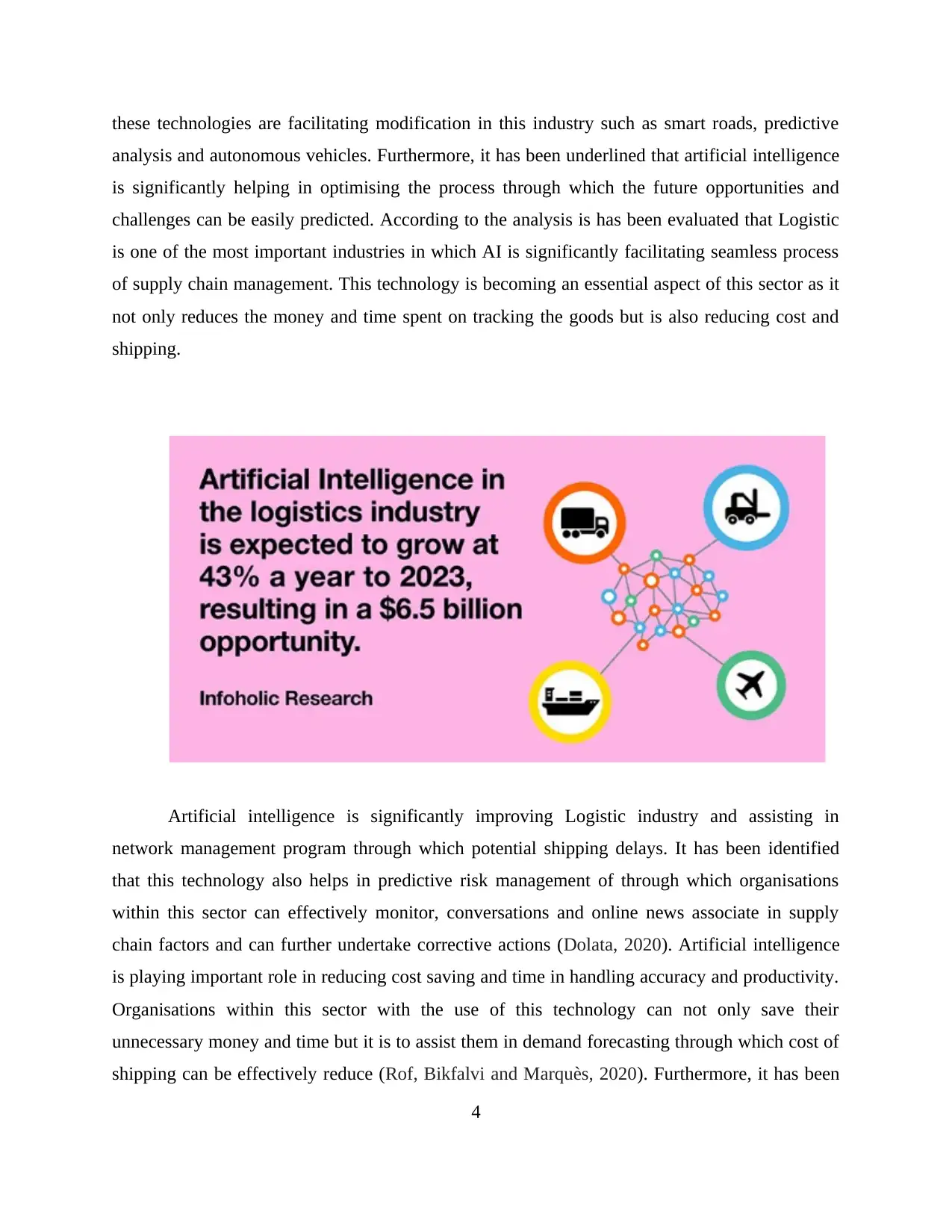
these technologies are facilitating modification in this industry such as smart roads, predictive
analysis and autonomous vehicles. Furthermore, it has been underlined that artificial intelligence
is significantly helping in optimising the process through which the future opportunities and
challenges can be easily predicted. According to the analysis is has been evaluated that Logistic
is one of the most important industries in which AI is significantly facilitating seamless process
of supply chain management. This technology is becoming an essential aspect of this sector as it
not only reduces the money and time spent on tracking the goods but is also reducing cost and
shipping.
Artificial intelligence is significantly improving Logistic industry and assisting in
network management program through which potential shipping delays. It has been identified
that this technology also helps in predictive risk management of through which organisations
within this sector can effectively monitor, conversations and online news associate in supply
chain factors and can further undertake corrective actions (Dolata, 2020). Artificial intelligence
is playing important role in reducing cost saving and time in handling accuracy and productivity.
Organisations within this sector with the use of this technology can not only save their
unnecessary money and time but it is to assist them in demand forecasting through which cost of
shipping can be effectively reduce (Rof, Bikfalvi and Marquès, 2020). Furthermore, it has been
4
analysis and autonomous vehicles. Furthermore, it has been underlined that artificial intelligence
is significantly helping in optimising the process through which the future opportunities and
challenges can be easily predicted. According to the analysis is has been evaluated that Logistic
is one of the most important industries in which AI is significantly facilitating seamless process
of supply chain management. This technology is becoming an essential aspect of this sector as it
not only reduces the money and time spent on tracking the goods but is also reducing cost and
shipping.
Artificial intelligence is significantly improving Logistic industry and assisting in
network management program through which potential shipping delays. It has been identified
that this technology also helps in predictive risk management of through which organisations
within this sector can effectively monitor, conversations and online news associate in supply
chain factors and can further undertake corrective actions (Dolata, 2020). Artificial intelligence
is playing important role in reducing cost saving and time in handling accuracy and productivity.
Organisations within this sector with the use of this technology can not only save their
unnecessary money and time but it is to assist them in demand forecasting through which cost of
shipping can be effectively reduce (Rof, Bikfalvi and Marquès, 2020). Furthermore, it has been
4
Paraphrase This Document
Need a fresh take? Get an instant paraphrase of this document with our AI Paraphraser
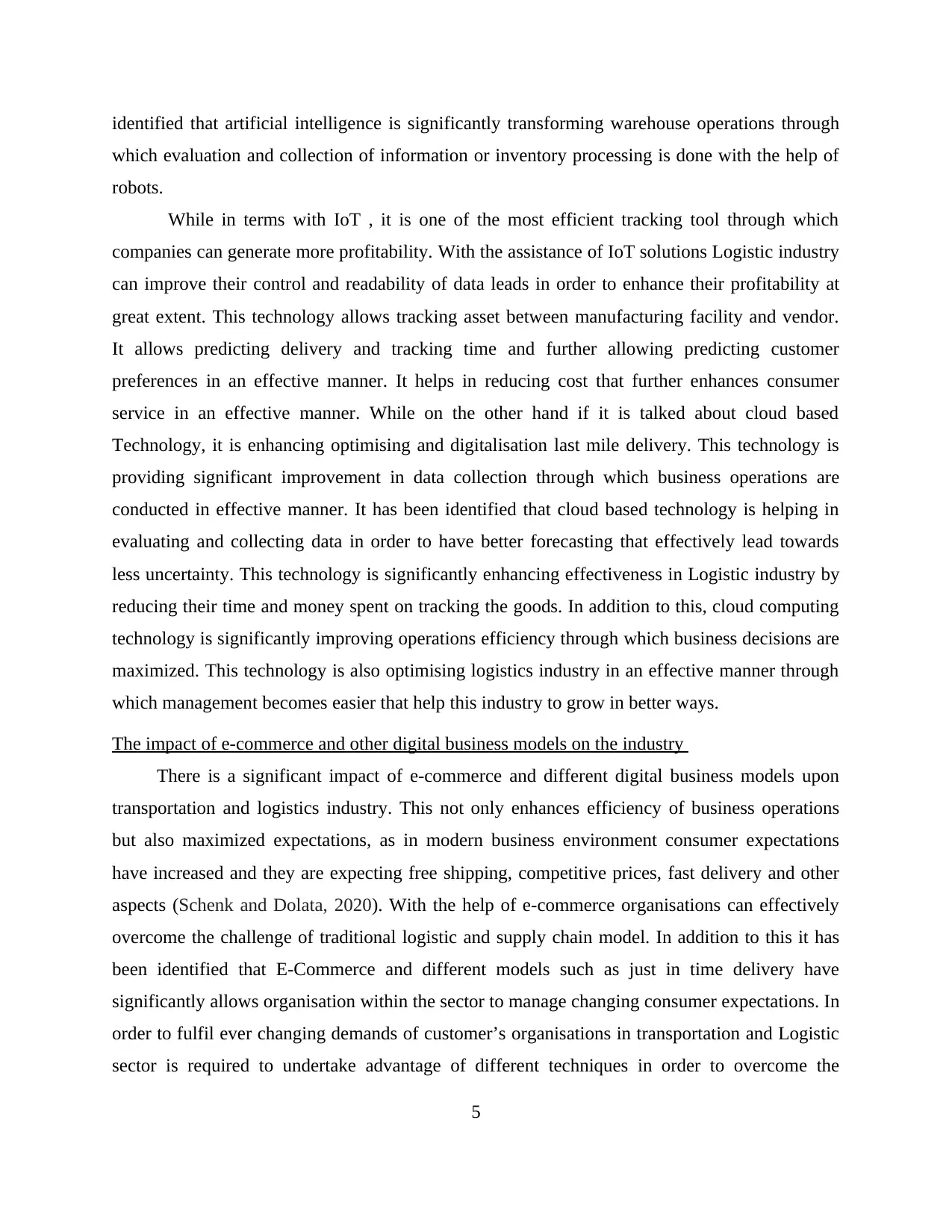
identified that artificial intelligence is significantly transforming warehouse operations through
which evaluation and collection of information or inventory processing is done with the help of
robots.
While in terms with IoT , it is one of the most efficient tracking tool through which
companies can generate more profitability. With the assistance of IoT solutions Logistic industry
can improve their control and readability of data leads in order to enhance their profitability at
great extent. This technology allows tracking asset between manufacturing facility and vendor.
It allows predicting delivery and tracking time and further allowing predicting customer
preferences in an effective manner. It helps in reducing cost that further enhances consumer
service in an effective manner. While on the other hand if it is talked about cloud based
Technology, it is enhancing optimising and digitalisation last mile delivery. This technology is
providing significant improvement in data collection through which business operations are
conducted in effective manner. It has been identified that cloud based technology is helping in
evaluating and collecting data in order to have better forecasting that effectively lead towards
less uncertainty. This technology is significantly enhancing effectiveness in Logistic industry by
reducing their time and money spent on tracking the goods. In addition to this, cloud computing
technology is significantly improving operations efficiency through which business decisions are
maximized. This technology is also optimising logistics industry in an effective manner through
which management becomes easier that help this industry to grow in better ways.
The impact of e-commerce and other digital business models on the industry
There is a significant impact of e-commerce and different digital business models upon
transportation and logistics industry. This not only enhances efficiency of business operations
but also maximized expectations, as in modern business environment consumer expectations
have increased and they are expecting free shipping, competitive prices, fast delivery and other
aspects (Schenk and Dolata, 2020). With the help of e-commerce organisations can effectively
overcome the challenge of traditional logistic and supply chain model. In addition to this it has
been identified that E-Commerce and different models such as just in time delivery have
significantly allows organisation within the sector to manage changing consumer expectations. In
order to fulfil ever changing demands of customer’s organisations in transportation and Logistic
sector is required to undertake advantage of different techniques in order to overcome the
5
which evaluation and collection of information or inventory processing is done with the help of
robots.
While in terms with IoT , it is one of the most efficient tracking tool through which
companies can generate more profitability. With the assistance of IoT solutions Logistic industry
can improve their control and readability of data leads in order to enhance their profitability at
great extent. This technology allows tracking asset between manufacturing facility and vendor.
It allows predicting delivery and tracking time and further allowing predicting customer
preferences in an effective manner. It helps in reducing cost that further enhances consumer
service in an effective manner. While on the other hand if it is talked about cloud based
Technology, it is enhancing optimising and digitalisation last mile delivery. This technology is
providing significant improvement in data collection through which business operations are
conducted in effective manner. It has been identified that cloud based technology is helping in
evaluating and collecting data in order to have better forecasting that effectively lead towards
less uncertainty. This technology is significantly enhancing effectiveness in Logistic industry by
reducing their time and money spent on tracking the goods. In addition to this, cloud computing
technology is significantly improving operations efficiency through which business decisions are
maximized. This technology is also optimising logistics industry in an effective manner through
which management becomes easier that help this industry to grow in better ways.
The impact of e-commerce and other digital business models on the industry
There is a significant impact of e-commerce and different digital business models upon
transportation and logistics industry. This not only enhances efficiency of business operations
but also maximized expectations, as in modern business environment consumer expectations
have increased and they are expecting free shipping, competitive prices, fast delivery and other
aspects (Schenk and Dolata, 2020). With the help of e-commerce organisations can effectively
overcome the challenge of traditional logistic and supply chain model. In addition to this it has
been identified that E-Commerce and different models such as just in time delivery have
significantly allows organisation within the sector to manage changing consumer expectations. In
order to fulfil ever changing demands of customer’s organisations in transportation and Logistic
sector is required to undertake advantage of different techniques in order to overcome the
5
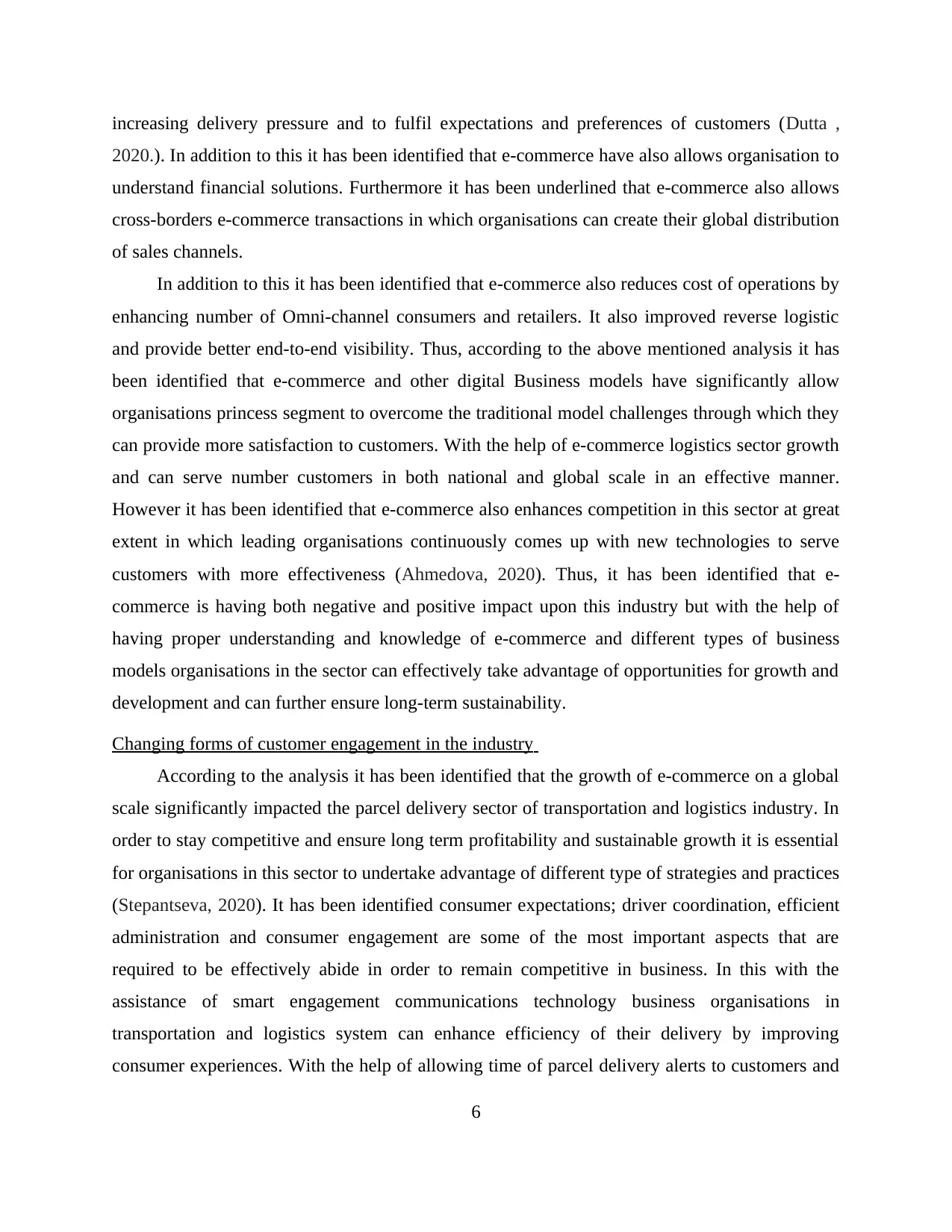
increasing delivery pressure and to fulfil expectations and preferences of customers (Dutta ,
2020.). In addition to this it has been identified that e-commerce have also allows organisation to
understand financial solutions. Furthermore it has been underlined that e-commerce also allows
cross-borders e-commerce transactions in which organisations can create their global distribution
of sales channels.
In addition to this it has been identified that e-commerce also reduces cost of operations by
enhancing number of Omni-channel consumers and retailers. It also improved reverse logistic
and provide better end-to-end visibility. Thus, according to the above mentioned analysis it has
been identified that e-commerce and other digital Business models have significantly allow
organisations princess segment to overcome the traditional model challenges through which they
can provide more satisfaction to customers. With the help of e-commerce logistics sector growth
and can serve number customers in both national and global scale in an effective manner.
However it has been identified that e-commerce also enhances competition in this sector at great
extent in which leading organisations continuously comes up with new technologies to serve
customers with more effectiveness (Ahmedova, 2020). Thus, it has been identified that e-
commerce is having both negative and positive impact upon this industry but with the help of
having proper understanding and knowledge of e-commerce and different types of business
models organisations in the sector can effectively take advantage of opportunities for growth and
development and can further ensure long-term sustainability.
Changing forms of customer engagement in the industry
According to the analysis it has been identified that the growth of e-commerce on a global
scale significantly impacted the parcel delivery sector of transportation and logistics industry. In
order to stay competitive and ensure long term profitability and sustainable growth it is essential
for organisations in this sector to undertake advantage of different type of strategies and practices
(Stepantseva, 2020). It has been identified consumer expectations; driver coordination, efficient
administration and consumer engagement are some of the most important aspects that are
required to be effectively abide in order to remain competitive in business. In this with the
assistance of smart engagement communications technology business organisations in
transportation and logistics system can enhance efficiency of their delivery by improving
consumer experiences. With the help of allowing time of parcel delivery alerts to customers and
6
2020.). In addition to this it has been identified that e-commerce have also allows organisation to
understand financial solutions. Furthermore it has been underlined that e-commerce also allows
cross-borders e-commerce transactions in which organisations can create their global distribution
of sales channels.
In addition to this it has been identified that e-commerce also reduces cost of operations by
enhancing number of Omni-channel consumers and retailers. It also improved reverse logistic
and provide better end-to-end visibility. Thus, according to the above mentioned analysis it has
been identified that e-commerce and other digital Business models have significantly allow
organisations princess segment to overcome the traditional model challenges through which they
can provide more satisfaction to customers. With the help of e-commerce logistics sector growth
and can serve number customers in both national and global scale in an effective manner.
However it has been identified that e-commerce also enhances competition in this sector at great
extent in which leading organisations continuously comes up with new technologies to serve
customers with more effectiveness (Ahmedova, 2020). Thus, it has been identified that e-
commerce is having both negative and positive impact upon this industry but with the help of
having proper understanding and knowledge of e-commerce and different types of business
models organisations in the sector can effectively take advantage of opportunities for growth and
development and can further ensure long-term sustainability.
Changing forms of customer engagement in the industry
According to the analysis it has been identified that the growth of e-commerce on a global
scale significantly impacted the parcel delivery sector of transportation and logistics industry. In
order to stay competitive and ensure long term profitability and sustainable growth it is essential
for organisations in this sector to undertake advantage of different type of strategies and practices
(Stepantseva, 2020). It has been identified consumer expectations; driver coordination, efficient
administration and consumer engagement are some of the most important aspects that are
required to be effectively abide in order to remain competitive in business. In this with the
assistance of smart engagement communications technology business organisations in
transportation and logistics system can enhance efficiency of their delivery by improving
consumer experiences. With the help of allowing time of parcel delivery alerts to customers and
6
⊘ This is a preview!⊘
Do you want full access?
Subscribe today to unlock all pages.

Trusted by 1+ million students worldwide
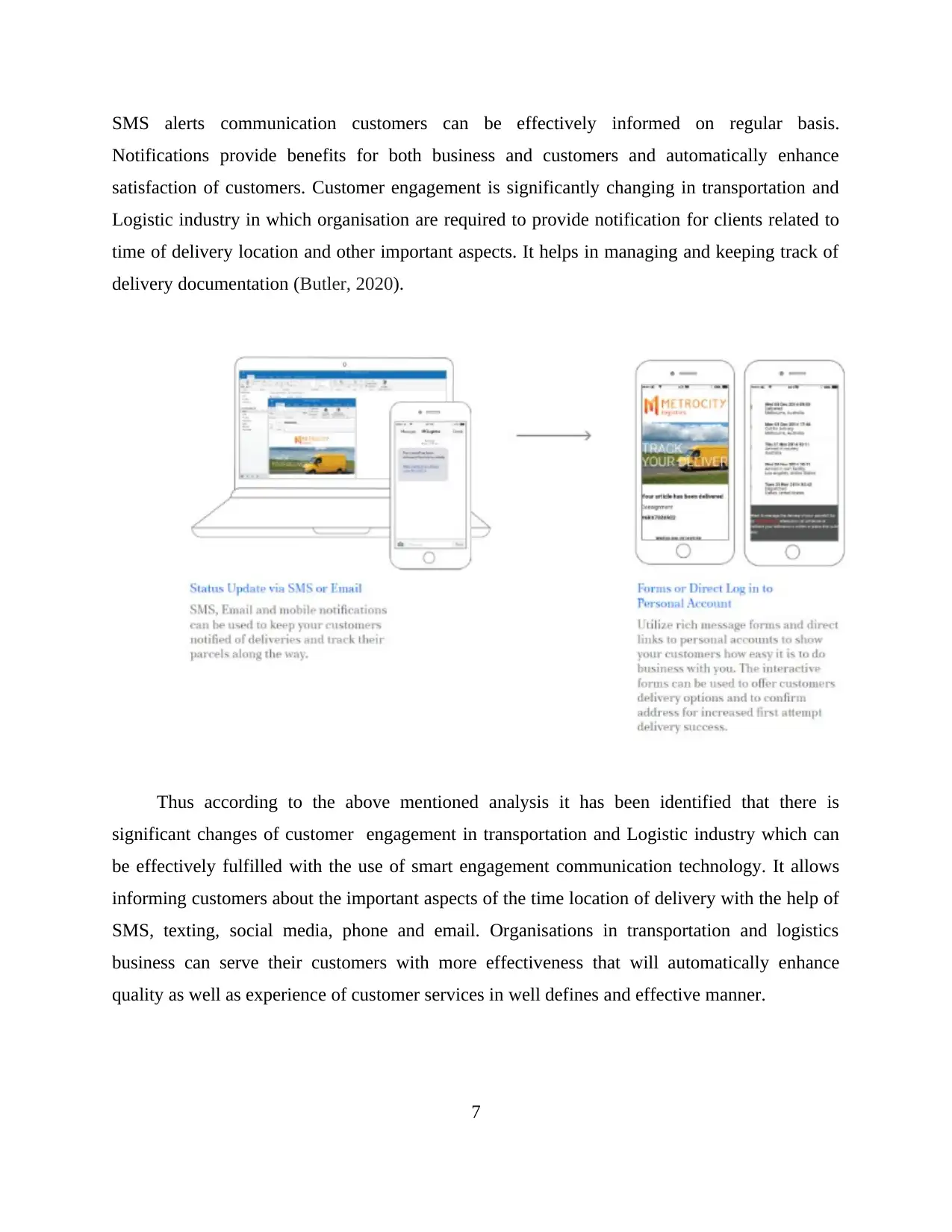
SMS alerts communication customers can be effectively informed on regular basis.
Notifications provide benefits for both business and customers and automatically enhance
satisfaction of customers. Customer engagement is significantly changing in transportation and
Logistic industry in which organisation are required to provide notification for clients related to
time of delivery location and other important aspects. It helps in managing and keeping track of
delivery documentation (Butler, 2020).
Thus according to the above mentioned analysis it has been identified that there is
significant changes of customer engagement in transportation and Logistic industry which can
be effectively fulfilled with the use of smart engagement communication technology. It allows
informing customers about the important aspects of the time location of delivery with the help of
SMS, texting, social media, phone and email. Organisations in transportation and logistics
business can serve their customers with more effectiveness that will automatically enhance
quality as well as experience of customer services in well defines and effective manner.
7
Notifications provide benefits for both business and customers and automatically enhance
satisfaction of customers. Customer engagement is significantly changing in transportation and
Logistic industry in which organisation are required to provide notification for clients related to
time of delivery location and other important aspects. It helps in managing and keeping track of
delivery documentation (Butler, 2020).
Thus according to the above mentioned analysis it has been identified that there is
significant changes of customer engagement in transportation and Logistic industry which can
be effectively fulfilled with the use of smart engagement communication technology. It allows
informing customers about the important aspects of the time location of delivery with the help of
SMS, texting, social media, phone and email. Organisations in transportation and logistics
business can serve their customers with more effectiveness that will automatically enhance
quality as well as experience of customer services in well defines and effective manner.
7
Paraphrase This Document
Need a fresh take? Get an instant paraphrase of this document with our AI Paraphraser
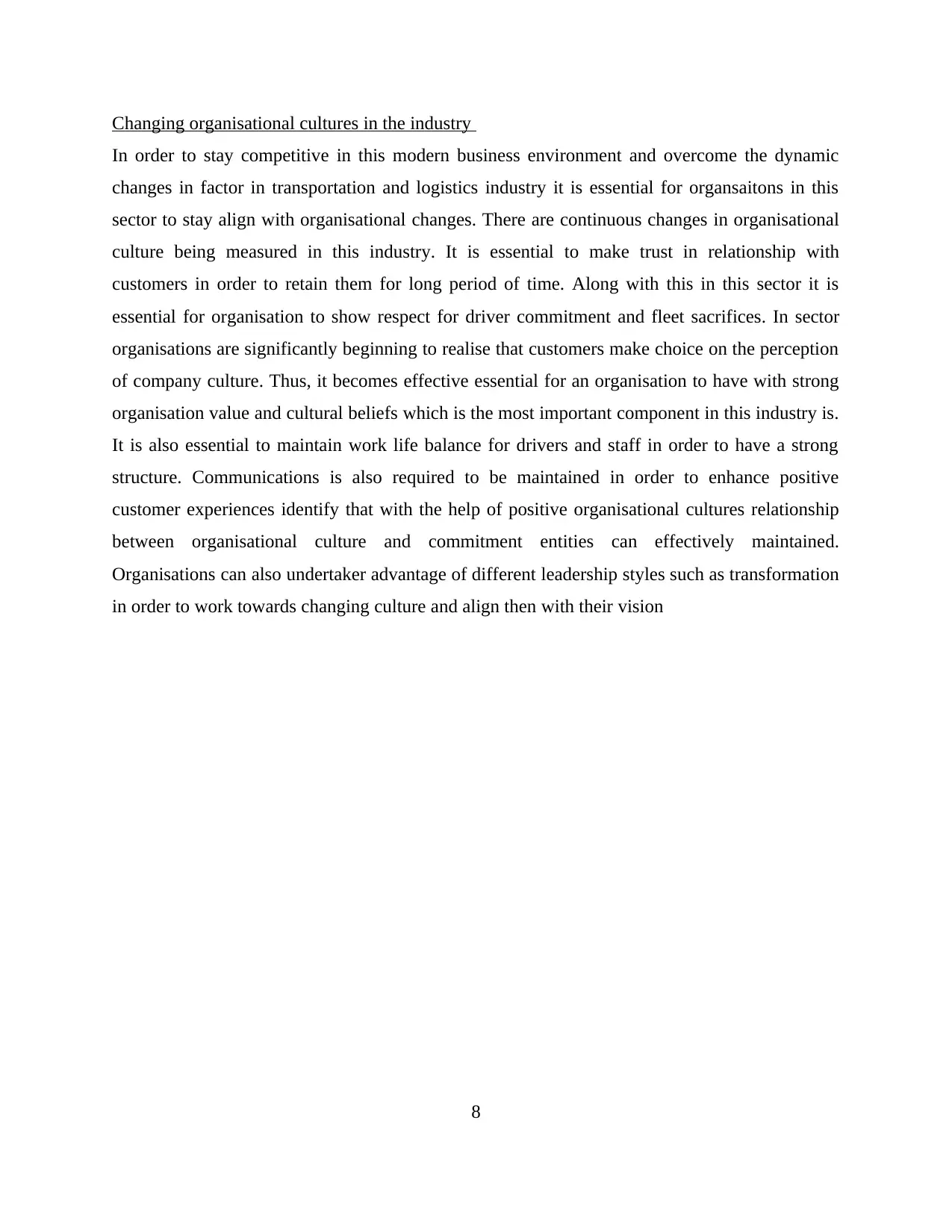
Changing organisational cultures in the industry
In order to stay competitive in this modern business environment and overcome the dynamic
changes in factor in transportation and logistics industry it is essential for organsaitons in this
sector to stay align with organisational changes. There are continuous changes in organisational
culture being measured in this industry. It is essential to make trust in relationship with
customers in order to retain them for long period of time. Along with this in this sector it is
essential for organisation to show respect for driver commitment and fleet sacrifices. In sector
organisations are significantly beginning to realise that customers make choice on the perception
of company culture. Thus, it becomes effective essential for an organisation to have with strong
organisation value and cultural beliefs which is the most important component in this industry is.
It is also essential to maintain work life balance for drivers and staff in order to have a strong
structure. Communications is also required to be maintained in order to enhance positive
customer experiences identify that with the help of positive organisational cultures relationship
between organisational culture and commitment entities can effectively maintained.
Organisations can also undertaker advantage of different leadership styles such as transformation
in order to work towards changing culture and align then with their vision
8
In order to stay competitive in this modern business environment and overcome the dynamic
changes in factor in transportation and logistics industry it is essential for organsaitons in this
sector to stay align with organisational changes. There are continuous changes in organisational
culture being measured in this industry. It is essential to make trust in relationship with
customers in order to retain them for long period of time. Along with this in this sector it is
essential for organisation to show respect for driver commitment and fleet sacrifices. In sector
organisations are significantly beginning to realise that customers make choice on the perception
of company culture. Thus, it becomes effective essential for an organisation to have with strong
organisation value and cultural beliefs which is the most important component in this industry is.
It is also essential to maintain work life balance for drivers and staff in order to have a strong
structure. Communications is also required to be maintained in order to enhance positive
customer experiences identify that with the help of positive organisational cultures relationship
between organisational culture and commitment entities can effectively maintained.
Organisations can also undertaker advantage of different leadership styles such as transformation
in order to work towards changing culture and align then with their vision
8
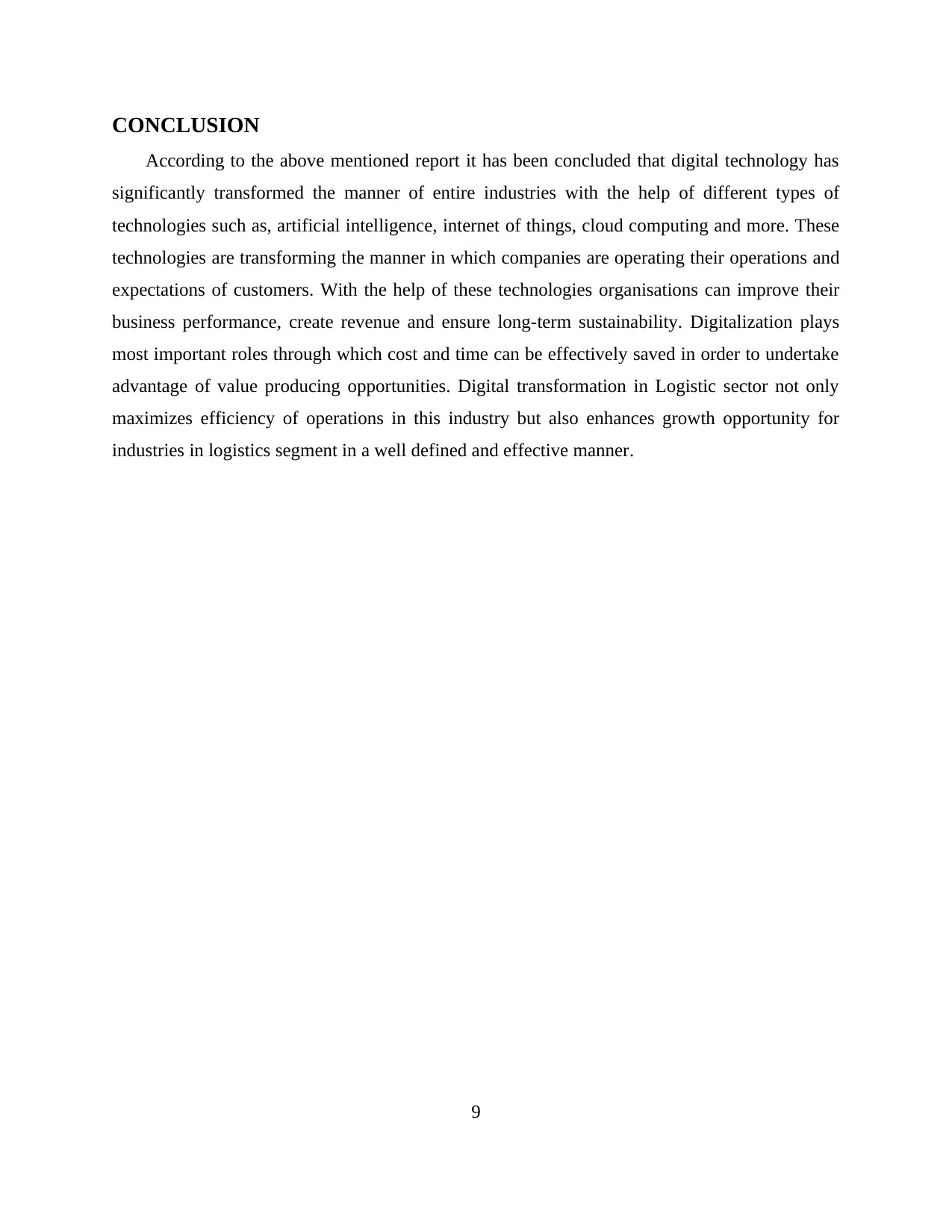
CONCLUSION
According to the above mentioned report it has been concluded that digital technology has
significantly transformed the manner of entire industries with the help of different types of
technologies such as, artificial intelligence, internet of things, cloud computing and more. These
technologies are transforming the manner in which companies are operating their operations and
expectations of customers. With the help of these technologies organisations can improve their
business performance, create revenue and ensure long-term sustainability. Digitalization plays
most important roles through which cost and time can be effectively saved in order to undertake
advantage of value producing opportunities. Digital transformation in Logistic sector not only
maximizes efficiency of operations in this industry but also enhances growth opportunity for
industries in logistics segment in a well defined and effective manner.
9
According to the above mentioned report it has been concluded that digital technology has
significantly transformed the manner of entire industries with the help of different types of
technologies such as, artificial intelligence, internet of things, cloud computing and more. These
technologies are transforming the manner in which companies are operating their operations and
expectations of customers. With the help of these technologies organisations can improve their
business performance, create revenue and ensure long-term sustainability. Digitalization plays
most important roles through which cost and time can be effectively saved in order to undertake
advantage of value producing opportunities. Digital transformation in Logistic sector not only
maximizes efficiency of operations in this industry but also enhances growth opportunity for
industries in logistics segment in a well defined and effective manner.
9
⊘ This is a preview!⊘
Do you want full access?
Subscribe today to unlock all pages.

Trusted by 1+ million students worldwide
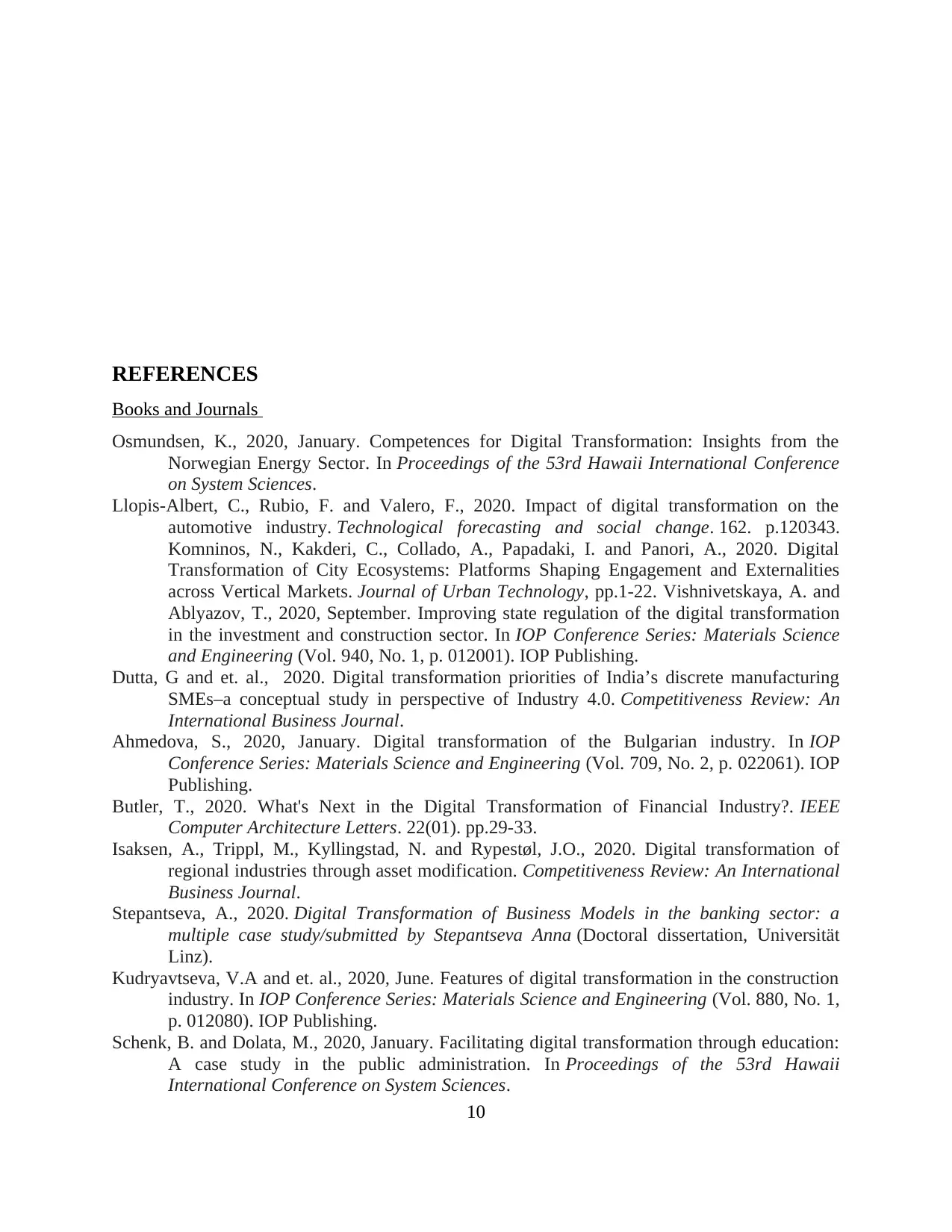
REFERENCES
Books and Journals
Osmundsen, K., 2020, January. Competences for Digital Transformation: Insights from the
Norwegian Energy Sector. In Proceedings of the 53rd Hawaii International Conference
on System Sciences.
Llopis-Albert, C., Rubio, F. and Valero, F., 2020. Impact of digital transformation on the
automotive industry. Technological forecasting and social change. 162. p.120343.
Komninos, N., Kakderi, C., Collado, A., Papadaki, I. and Panori, A., 2020. Digital
Transformation of City Ecosystems: Platforms Shaping Engagement and Externalities
across Vertical Markets. Journal of Urban Technology, pp.1-22. Vishnivetskaya, A. and
Ablyazov, T., 2020, September. Improving state regulation of the digital transformation
in the investment and construction sector. In IOP Conference Series: Materials Science
and Engineering (Vol. 940, No. 1, p. 012001). IOP Publishing.
Dutta, G and et. al., 2020. Digital transformation priorities of India’s discrete manufacturing
SMEs–a conceptual study in perspective of Industry 4.0. Competitiveness Review: An
International Business Journal.
Ahmedova, S., 2020, January. Digital transformation of the Bulgarian industry. In IOP
Conference Series: Materials Science and Engineering (Vol. 709, No. 2, p. 022061). IOP
Publishing.
Butler, T., 2020. What's Next in the Digital Transformation of Financial Industry?. IEEE
Computer Architecture Letters. 22(01). pp.29-33.
Isaksen, A., Trippl, M., Kyllingstad, N. and Rypestøl, J.O., 2020. Digital transformation of
regional industries through asset modification. Competitiveness Review: An International
Business Journal.
Stepantseva, A., 2020. Digital Transformation of Business Models in the banking sector: a
multiple case study/submitted by Stepantseva Anna (Doctoral dissertation, Universität
Linz).
Kudryavtseva, V.A and et. al., 2020, June. Features of digital transformation in the construction
industry. In IOP Conference Series: Materials Science and Engineering (Vol. 880, No. 1,
p. 012080). IOP Publishing.
Schenk, B. and Dolata, M., 2020, January. Facilitating digital transformation through education:
A case study in the public administration. In Proceedings of the 53rd Hawaii
International Conference on System Sciences.
10
Books and Journals
Osmundsen, K., 2020, January. Competences for Digital Transformation: Insights from the
Norwegian Energy Sector. In Proceedings of the 53rd Hawaii International Conference
on System Sciences.
Llopis-Albert, C., Rubio, F. and Valero, F., 2020. Impact of digital transformation on the
automotive industry. Technological forecasting and social change. 162. p.120343.
Komninos, N., Kakderi, C., Collado, A., Papadaki, I. and Panori, A., 2020. Digital
Transformation of City Ecosystems: Platforms Shaping Engagement and Externalities
across Vertical Markets. Journal of Urban Technology, pp.1-22. Vishnivetskaya, A. and
Ablyazov, T., 2020, September. Improving state regulation of the digital transformation
in the investment and construction sector. In IOP Conference Series: Materials Science
and Engineering (Vol. 940, No. 1, p. 012001). IOP Publishing.
Dutta, G and et. al., 2020. Digital transformation priorities of India’s discrete manufacturing
SMEs–a conceptual study in perspective of Industry 4.0. Competitiveness Review: An
International Business Journal.
Ahmedova, S., 2020, January. Digital transformation of the Bulgarian industry. In IOP
Conference Series: Materials Science and Engineering (Vol. 709, No. 2, p. 022061). IOP
Publishing.
Butler, T., 2020. What's Next in the Digital Transformation of Financial Industry?. IEEE
Computer Architecture Letters. 22(01). pp.29-33.
Isaksen, A., Trippl, M., Kyllingstad, N. and Rypestøl, J.O., 2020. Digital transformation of
regional industries through asset modification. Competitiveness Review: An International
Business Journal.
Stepantseva, A., 2020. Digital Transformation of Business Models in the banking sector: a
multiple case study/submitted by Stepantseva Anna (Doctoral dissertation, Universität
Linz).
Kudryavtseva, V.A and et. al., 2020, June. Features of digital transformation in the construction
industry. In IOP Conference Series: Materials Science and Engineering (Vol. 880, No. 1,
p. 012080). IOP Publishing.
Schenk, B. and Dolata, M., 2020, January. Facilitating digital transformation through education:
A case study in the public administration. In Proceedings of the 53rd Hawaii
International Conference on System Sciences.
10
Paraphrase This Document
Need a fresh take? Get an instant paraphrase of this document with our AI Paraphraser
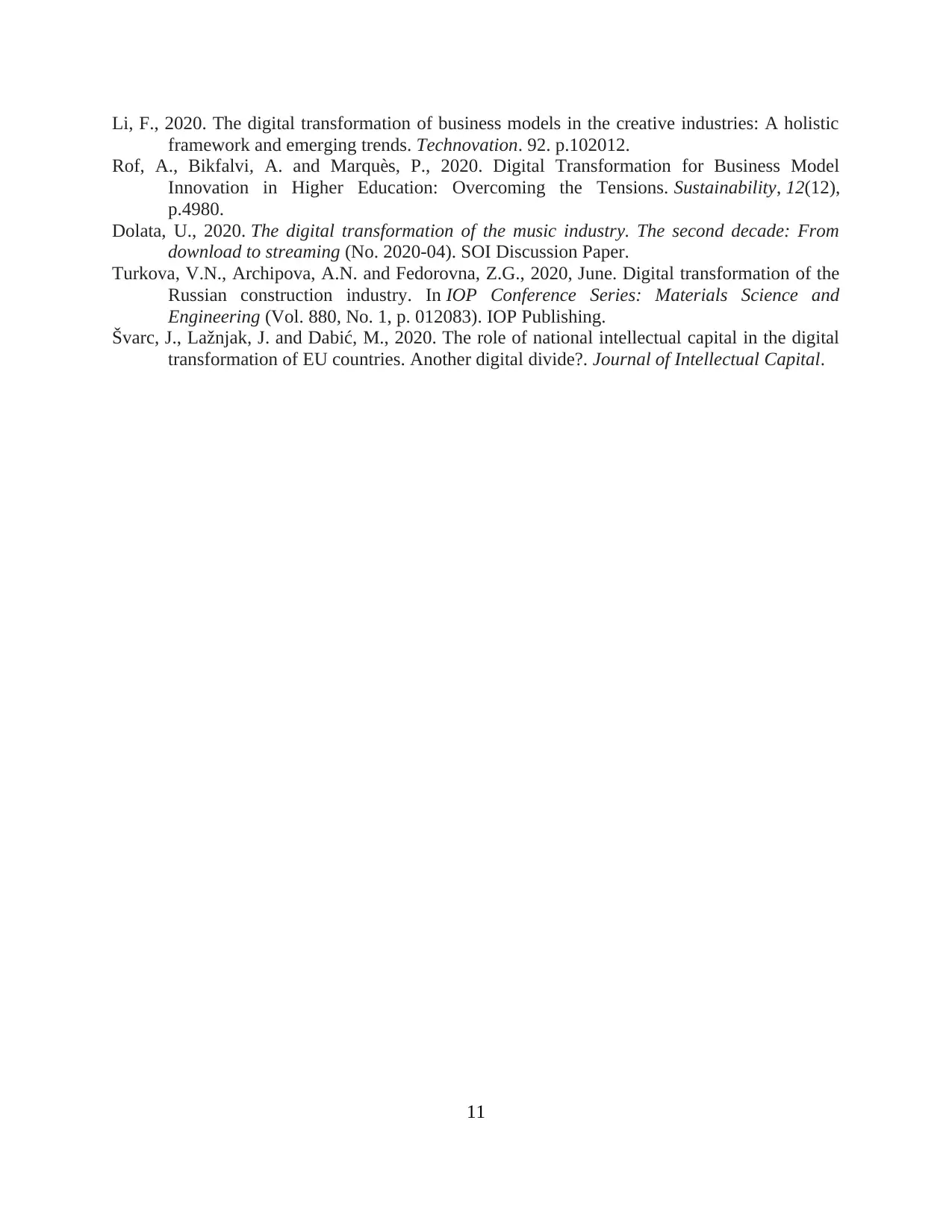
Li, F., 2020. The digital transformation of business models in the creative industries: A holistic
framework and emerging trends. Technovation. 92. p.102012.
Rof, A., Bikfalvi, A. and Marquès, P., 2020. Digital Transformation for Business Model
Innovation in Higher Education: Overcoming the Tensions. Sustainability, 12(12),
p.4980.
Dolata, U., 2020. The digital transformation of the music industry. The second decade: From
download to streaming (No. 2020-04). SOI Discussion Paper.
Turkova, V.N., Archipova, A.N. and Fedorovna, Z.G., 2020, June. Digital transformation of the
Russian construction industry. In IOP Conference Series: Materials Science and
Engineering (Vol. 880, No. 1, p. 012083). IOP Publishing.
Švarc, J., Lažnjak, J. and Dabić, M., 2020. The role of national intellectual capital in the digital
transformation of EU countries. Another digital divide?. Journal of Intellectual Capital.
11
framework and emerging trends. Technovation. 92. p.102012.
Rof, A., Bikfalvi, A. and Marquès, P., 2020. Digital Transformation for Business Model
Innovation in Higher Education: Overcoming the Tensions. Sustainability, 12(12),
p.4980.
Dolata, U., 2020. The digital transformation of the music industry. The second decade: From
download to streaming (No. 2020-04). SOI Discussion Paper.
Turkova, V.N., Archipova, A.N. and Fedorovna, Z.G., 2020, June. Digital transformation of the
Russian construction industry. In IOP Conference Series: Materials Science and
Engineering (Vol. 880, No. 1, p. 012083). IOP Publishing.
Švarc, J., Lažnjak, J. and Dabić, M., 2020. The role of national intellectual capital in the digital
transformation of EU countries. Another digital divide?. Journal of Intellectual Capital.
11
1 out of 11
Related Documents
Your All-in-One AI-Powered Toolkit for Academic Success.
+13062052269
info@desklib.com
Available 24*7 on WhatsApp / Email
![[object Object]](/_next/static/media/star-bottom.7253800d.svg)
Unlock your academic potential
Copyright © 2020–2026 A2Z Services. All Rights Reserved. Developed and managed by ZUCOL.




